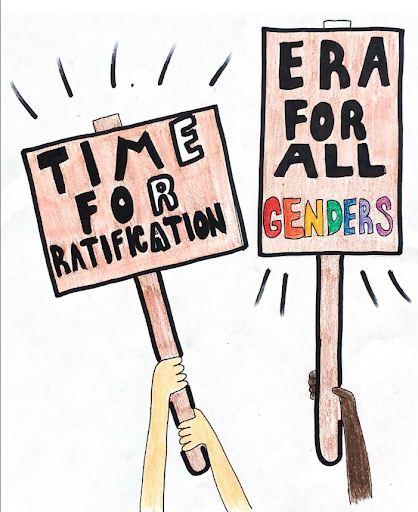
In January 2020, the Virginia General Assembly became the 38th state legislature to ratify the Equal Rights Amendment (ERA). With that, the amendment finally crossed the threshold of ratification from 38 states required for new amendments to be added to the U.S. Constitution. The only catch? The deadline to hit 38 states set when the U.S. Congress first approved the ERA expired almost 30 years ago. However, bipartisan resolutions currently in both chambers of Congress are advocating for the removal of that 1982 deadline and the adoption of the ERA as the 28th Amendment of the Constitution. I know the Lewis & Clark community cares about equal rights, so I enthusiastically believe that we should all be pressuring our elected officials to support the ERA. However, I also think we need to be fighting for more expansive constitutional amendments that would protect all members of our community.
First of all, it is important to look at what the ERA actually says. When you hear about the massive controversy over the amendment in the 1970s with supporters like Shirley Chisholm, Betty Friedan and Gloria Steinem publicly sparring with Phyllis Schlafly and her STOP ERA organization, you might think that the ERA is a long-winded manifesto rife with contentious language and radical provisions. You might then be surprised to see that the text of the ERA approved by Congress in 1972 is particularly brief.
In full, the ERA reads, “Equality of rights under the law shall not be denied or abridged by the United States or by any state on account of sex. The Congress shall have the power to enforce, by appropriate legislation, the provisions of this article. This amendment shall take effect two years after the date of ratification.” That is it. In just three sentences, the ERA seeks to bring gender equality to the United States after centuries of discrimination against women perpetrated by the patriarchal systems and institutions of this country. It is remarkable to imagine that three sentences could be simultaneously so powerful and so simple. Yet it is from this simplicity that a problem emerges.
The text of the ERA only ensures equality of rights “on account of sex.” What about equality on account of sexual orientation and gender identity? Some people say that the concept of sex is so intertwined with sexuality and gender that the word “sex” is sufficient to extend protections to the LGBTQ+ community. However, if the ERA were formally adopted, any claims of its violation would be subject to review by the U.S. Supreme Court, and the Court’s 6-3 conservative majority would almost certainly take the word “sex” at face-value.
Additionally, the ERA fails to adequately provide protections for Americans of color. As things currently stand, the Supreme Court relies on the Equal Protection Clause of the 14th Amendment to review claims of racial discrimination. This process has been responsible for important advancements such as ending school segregation, prohibiting laws against interracial marriage and supporting affirmative action programs. It is great that the Supreme Court has historically used the guarantee of equal protection to move toward racial equality, but the 14th Amendment never explicitly mentions race. We need to have a constitutional amendment that clearly protects the equality of rights on account of race and ethnicity to ensure that people of color in the United States have the highest level of security against discrimination.
By saying the ERA does not go far enough, I certainly do not mean to discount the hard work of the activists who got the amendment approved by Congress in the first place. Its adoption into the Constitution would be an immensely important step toward achieving equality for Americans. However, in order to ensure constitutional protection for all members of our community, we need something beyond the ERA. Whether this looks like an updated version of the amendment or an entirely new amendment effort, I do not know. Either way, I look forward to rooting for the bipartisan resolutions in Congress and continuing to fight for equal rights for all, and I hope my peers at LC will join me.
This article presents opinions held by the author, not those of The Pioneer Log and its editorial board.
Subscribe to the Mossy Log Newsletter
Stay up to date with the goings-on at Lewis & Clark! Get the top stories or your favorite section delivered to your inbox whenever we release a new issue.

Leave a Reply